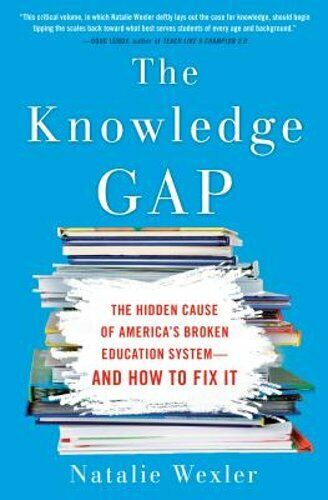At First Things, M.D. Aeschliman reviews The Knowledge Gap: The Hidden Cause of America’s Broken Education System — and How to Fix It by Natalie Wexler:
E.D. Hirsch Jr., distinguished scholar of comparative literature, is the most important advocate for K–12 education reform of the past seventy-five years. Natalie Wexler’s recent book The Knowledge Gap is a helpful examination of Hirsch’s critical analyses and intellectual framework, as well as the elementary school curriculum that he designed — Core Knowledge.
One of Hirsch’s key focal points is the vapid, supposedly “developmentally appropriate” fictions that dominate language arts curricula in elementary schools — mind-numbingly banal stories with single-syllable vocabularies and large pictures. These silly literary fictions and fantasies have helped “dumb down” a hundred years of American students by eliminating or forbidding any substantial reading of expository prose about history and science in the first eight grades. A poignant narrative well worth reading is Harold Henderson’s Let’s Kill Dick and Jane, which details a noble but ultimately losing fight waged by a family firm from 1962 to 1996 against the big textbook publishers.
After a teaching career of fifty years, I agree with Hirsch that the primary problem in American public education is not the high schools, but the poorly organized, ineffective elementary school curricula, including the idiotic books of childish fiction. As Wexler writes, the governing “approach to reading instruction … leaves … many students unprepared to tackle high-school-level work”. Pity the poor high school teachers.
A hundred years ago John Dewey and his lieutenants from Columbia Teachers College, especially William H. Kilpatrick, started dismantling academic “subjects” in favor of “the project method”. They also worked to redefine history as “social studies”, a degenerative development that has continued without cease in our K–12 schools, leading to ludicrous presentism. Dewey and the progressives also attacked traditional language classes — especially phonics but also Latin — opening the way for “naturalistic” literacy instruction that has proved to be ineffective. Yet it should be obvious that students must “learn to read” well early on so as to “read to learn” for high school and college and the rest of their lives. And what they read early on is important.
The “progressive” educational assault on traditional American education had another source, which might be called “soft utopianism”. Twenty-five years ago Hirsch was already writing powerfully — in The Schools We Need and Why We Don’t Have Them — about this romantic-progressive “soft utopianism” and how it conflicted with what is wisest and best in the thinking, writings, and achievements of the founding fathers and their early republic. Yet he also knew — as himself a repentant progressive “mugged by reality” — that in the nineteenth century the republican educational legacy was already under intellectual assault by Rousseau’s American disciples Emerson, Thoreau, and Walt Whitman. Whitman’s egalitarian naturalism was one of Dewey’s greatest inspirations by the early twentieth century.
The progressives particularly dislike history, and our current “Great Awakening” indicates this. A few years ago, the former superintendent of the school system of one of our most “liberal” states said to me in private conversation that “the progressives hate history and won’t tolerate it in the curriculum”. They hate it because any thinking about history requires ethical assumptions and qualitative judgments: What in the past is worth studying? How do we structure our narratives? How do we fairly evaluate historical personalities and events? Which ones were virtuous and beneficial? These and related questions require some standard of justice and the idea that most individuals — in the past and present — have some degree of free will and some disposition to ethics: the “self-evident truths” of our founding document, and of civilization itself.




